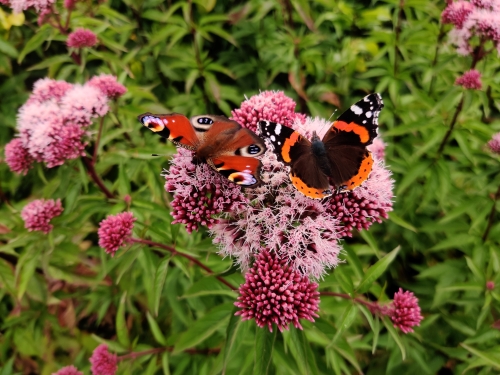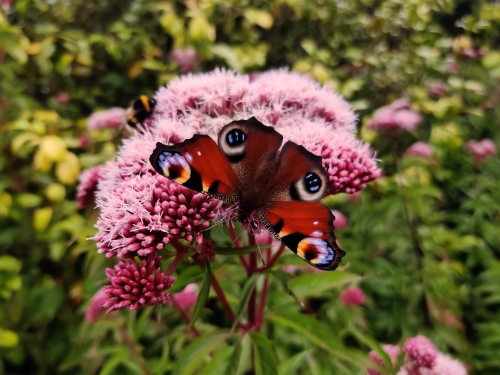Food For Thought - Our Wonderful Pollinators
By Usna Keating; Biodiversity officer
As you may be aware, Ireland is home to a rich diversity of pollinators. Pollinators are part of Ireland’s biodiversity, and they are very important. These species are important in their own right, but also important to a myriad of plants and species that depend on them, including ourselves.
Pollinators are essential as they are required by most plant species, to reproduce. Therefore, without pollinators, and the act of pollination, some plant species would not produce fruits, and would not produce seeds. The pollinator brings the pollen from one plant to the stigma of another – causing plant fertilisation.

Peacock and Red Admiral Butterflies. Photo Credit: Usna Keating
Most of the fruits we eat, the fruits in shops and supermarkets, in orchards and woodlands, and in hedgerows and gardens, would not exist without pollinators. These fruits and their seeds are important for so many other species. They are a food source for many, particularly in times of the breeding season. They are also a food source for insects, on which other animals, such as many of our garden birds depend. They also help plants produce the seeds for new plants to grow from. Thus our pollinators support our ecosystems.
In this sense pollinators play an essential role in the Irish landscape. When people think of pollinators, most think of the honeybee. In fact, the honeybee is just one of our many bee species. Other bees include the bumble bees, and the solitary bees. Other pollinators include butterflies and moths, as well as other flying insects. Our solitary bees actually do a lot more pollinating than our honeybees, yet they have kept a very low profile.
Research is showing alarming declines in our pollinating species. These declines are particularly pronounced for some species, including many solitary and bumble bees. Indeed experts in this area are alarmed by these declines. One of the major causes for pollinator declines is a lack of food for pollinating species, in other words, a lack of flowers.
Thankfully in Ireland, we are coming up with creative plans to support the conservation and protection of pollinators. The National Biodiversity Data Centre is leading much of the research, policy and initiatives in this area. One of the initiatives being promoted is ‘No Mow May’.
Pollinators don’t just need flowers in May, they need flowers in the other months too, when pollinators are most active (from Spring to Autumn). No Mow May is about raising awareness of the importance of flowers for pollinators. One could also consider implementing ‘Let it Bloom June’.
By letting lawns and grasslands grow, this allows flowers grow too. These flowers are so important for our insects and pollinators. It is true that not everybody can implement ‘No Mow May’ for a variety of reasons. Some may not have the equipment to cut long grasses, some may feel pressure in their neighbourhoods to keep their gardens ‘tidy’. It is important not to judge people if they do decide to cut their lawns.

Peacock Butterfly. Photo Credit: Usna Keating
One thing to keep in mind is pollinators need food. By mowing all our grasslands at once, it cuts away the food. The best outcome for pollinators is when food is always available. Therefore, rotational mowing is a really good way to ensure food is left in your garden for pollinators. By mowing one lawn, or one side of the path only, it can leave food in the other lawn, or other side of the garden. When the next cut occurs, the previously mowed lawn can be left un-mowed, and already shows the growth of Buttercup, Dandelion, and Clover. Rotational mowing like this (even if mowing occurs in May), ensures that there is always food availability for pollinators.
The No Mow May initiative is positive, but less regular mowing in other months is also very important to bear in mind. It is very important to support our pollinators, and rotational mowing and localised mowing in May is also something that is very acceptable. The National Biodiversity Data Centre, and All Ireland Pollinator Plan have some wonderful resources on pollinators.
Another thing to bear in mind is that our pollinators have, over many centuries, and even millennia, adapted to our native species. Therefore, many of our native species are the optimal species to support our pollinators.
You can find out more about pollinators on the Pollinators.ie website:
- Adoption of Local Authority Climate Action Plan
- Cork Metropolitan Area | Walking and Cycling Index 2023
- Earth Hour 2024
- Every Action Matters Event
- Every Action Matters Round-up
- EU Sparks for Climate | Citizens Hackathon Championship
- Food For Thought - Our Wonderful Pollinators
- Living With Water - Story Map
- Cork City celebrates its Community Climate Leaders
- Cork City welcomes representatives of the NetZeroCities Consortium
- Cork City Council is on target to meet our energy reduction commitments by 2030
- Wheeling and Dealing – Cork City Council agrees Local Green Deals.
- Cork City wins European Award for its Local Green Deals
- Open Streets returns this Summer!
- Cork City has been awarded a Mission Label in the Climate Neutral & Smart Cities Mission
- Why I Keep Canteen Food Scraps in a Closet at City Hall
- Building Resilience to Climate Change Workshop

